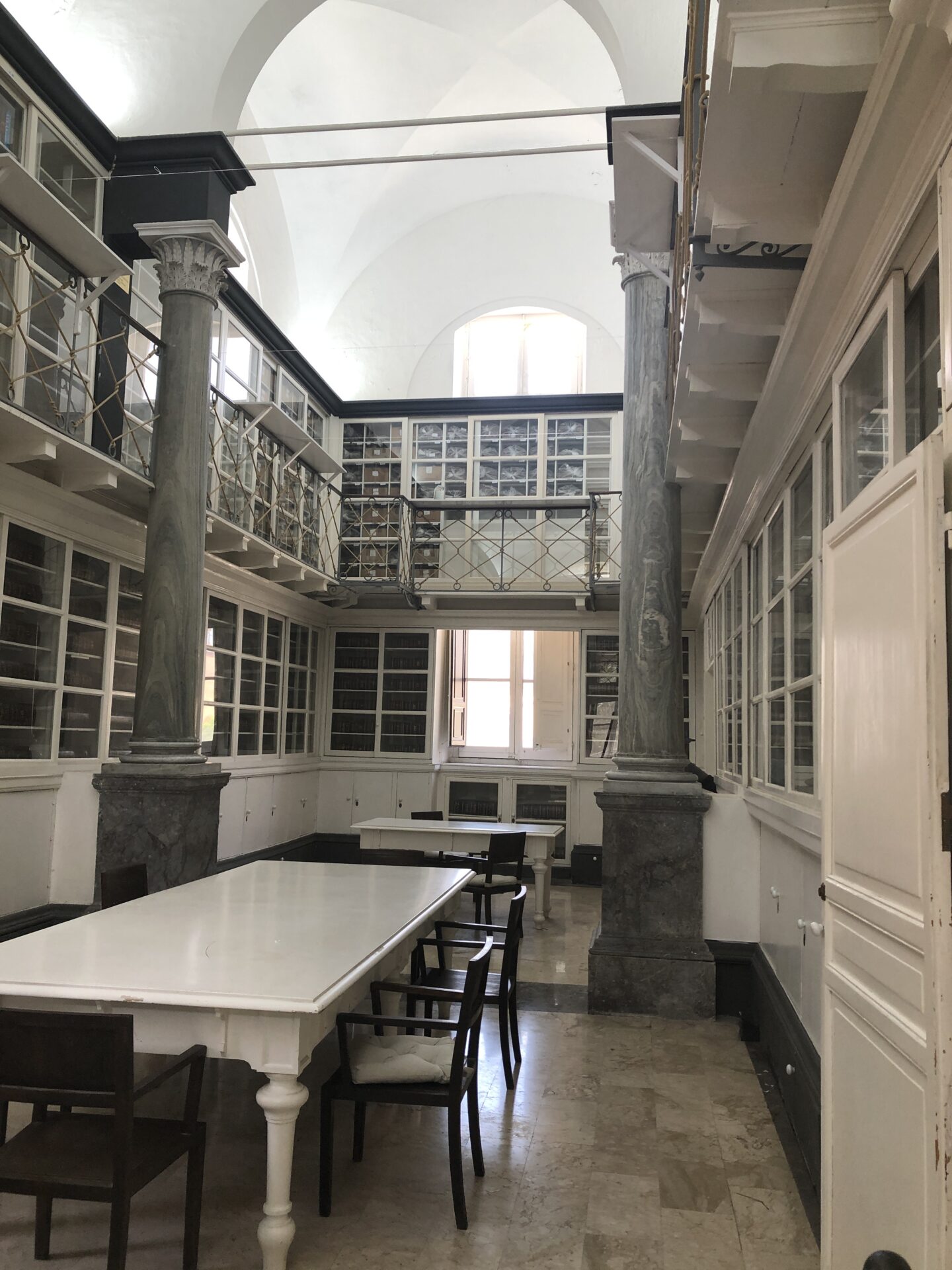
Above, a photo of the splendid botanical library in Palermo’s Orto Botanico (as mentioned in my last post) — where we enjoyed the cool contrast to the noonday heat just outside. Since we’ve been home, six weeks now, we’ve had only very measured and very temperate sunshine, and all the rain I could want to justify sitting on my couch with a stack of books. . . .
Herewith, the list that made June’s rainfall tolerable for me. As usual, numbering comes from my Reading Journal; the italicized portions below are transcribed directly from the handwritten entries in that notebook.
34. La Costola di Adamo. Antonio Mazzini. Mystery. Police Procedural. Rocco Schiavone series. Set in Valle d’Aosta, Italy. Italian. English translation available, titled Adam’s Rib.
I found it much easier to read this than I did the first Rocco Schiavone — I’d guess that I’ve absorbed a fair bit of vocabulary that was — ha! — foreign to me in the first volume of the series. Also probably getting comfortable with Mazzini’s style, syntax, etc. And knowing the context.
The plot here is much more satisfying than that of Pista Nera, and Schiavone is revealed to be a better sort of misogynist (because he’s still a pig about women, regularly, still misogynistic) than he first appeared. We learn more about his deceased wife, learn why he was banished from Rome, see him form an interesting friendship with a woman he meets on a case.
And his assessment of Valle d’Aosta might be shifting, ever so slightly.
35. Real Estate. Deborah Levy. Autobiography. Literary autobiography. Creative non-fiction. Women’s lives. Woman at 60. Feminist writer. British writer. Set in London, Paris, Greece.
So many quotations I will return to in this book.
She speaks, in the book’s opening pages, of a book she has brought with her to a new “writing shed” (part of the “real estate” she is contemplating). The book was inscribed to her 20-years-younger self by her then-husband, the father of her daughters. Oddly, she notes, “the book itself (by a famous male author) was about a man who has left his family and sets about making a new life with various women” and she’s bemused at how devoid of independent thought or feeling this male author has made the women in his novel: “If this author’s female character feels or thinks about anything at all, her feelings and thoughts are about [the man who has left his family].” And then, positing that she “had requested this book at the time” and “perhaps . . . had turned . . . a blind eye” or maybe there was something, she continues. . .
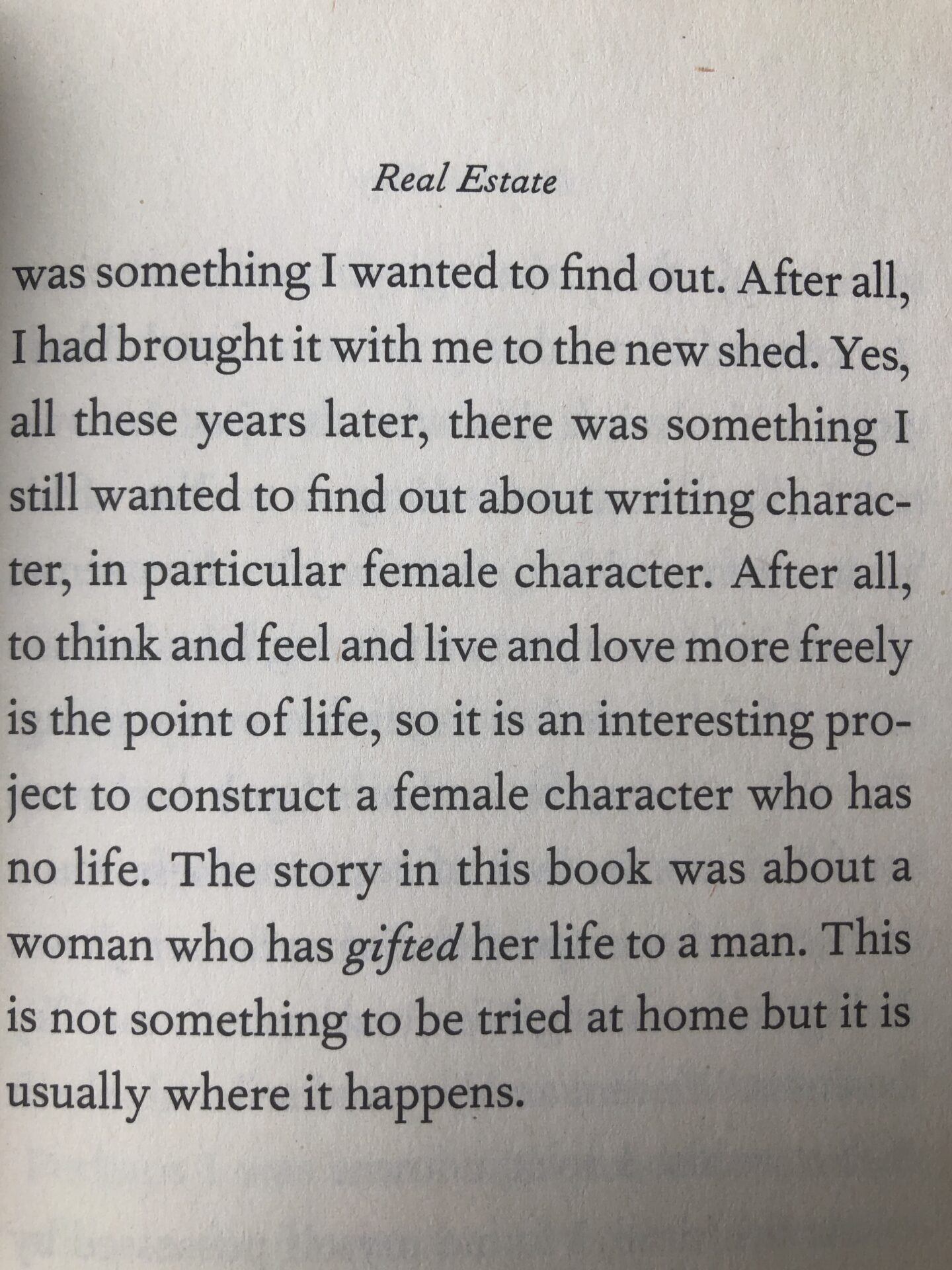
The dryness of that last sentence!
I’ll never finish this post if I continue augmenting my handwritten journal entries as I’m doing now, so I’ll turn to transcription now instead. There, as well, I wanted to record passages . . . .
“The only plan was my villa with its pomegranate tree, mimosa trees, its fireplace in the shape of an ostrich egg and the river and rowing boat called Sister Rosetta. I had no B plan yet in life you need a few B’s”. The writer has gradually assembled an image of the “real estate” she wishes for, all bits and pieces drawn from various experiences and visions through her life. . . but she finds herself still in very modest living conditions and in a transient state. And when her rental house in Greece has sand trickling through a hole in its wall, she writes “The hole in the wall was a portal, not to another world, but to this one, in which I was endlessly searching for home, as if it were an elusive lover.”
In this 3rd volume of Levy’s series of Living Autobiography, she’s writing about herself as she approaches and celebrates her 60th birthday, single, her daughters now adults. She is recognized for her work, can look at her success, but she also examines the gap between her dreams and her actual situation. I mentioned Volumes 1 and 2 in my, hmm, frugally worded 2018 Reading List, where they appear as #86 and #87.
Numerous chapters written in Paris (see an excerpt of one in my IG post) , where she’s been awarded a significant fellowship. . . . I loved this book and I’m really glad I have a copy to note passages in, to return to and reread, to read to others — so that I don’t have to write the essay I’m tempted to here!
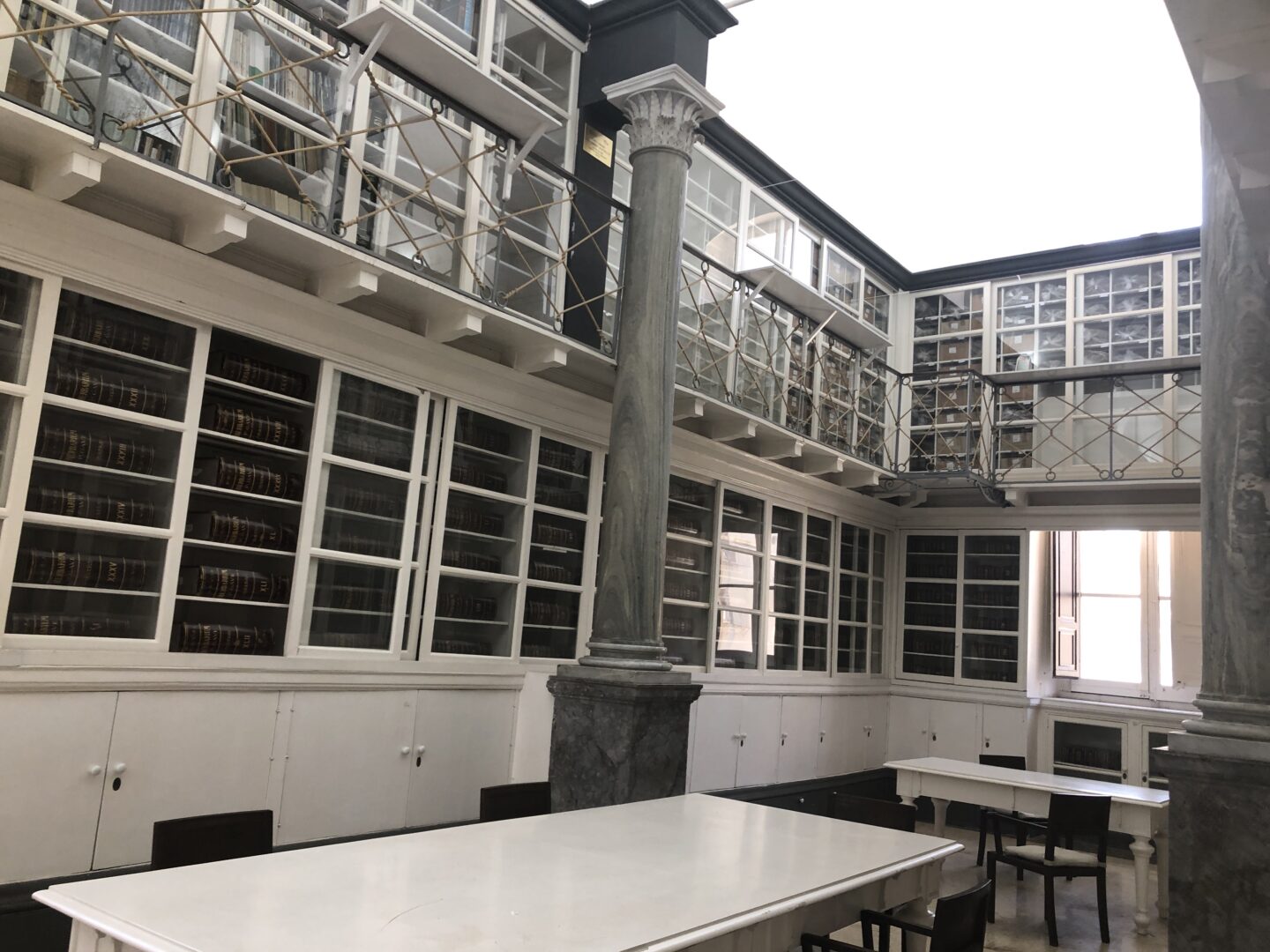
36. Give Unto Others. Donna Leon. Mystery/Police Procedural. Commissario Brunetti series. Set in Venice.
One of the best Commissario Brunetti books of recent years. Brunetti gets himself — and several of his colleagues, including, of course, Signorina Elettra — embroiled in a problem he’s taken on for a neighbour from his childhood and adolescence. As he gradually remembers more and more of why he didn’t like her (but liked and respected her mother), the “problem” grows and Brunetti realizes his investigations are overlapping with investigations into more serious crimes — and he has compromised himself and his trusted colleagues for someone he dislikes . . . and mistrusts. How will he disentangle himself? Can he?
You can find other (brief) reviews of the Brunetti mysteries I’ve posted here over the years by using the Search feature at the top of the page — I had better success using “Commissario Brunetti” than I did with “Donna Leon,” but your mileage may vary 😉
37. Mindful of Murder. Susan Juby. Mystery. Comedic. Island Life, Pacific Northwest. New Age Spirituality.
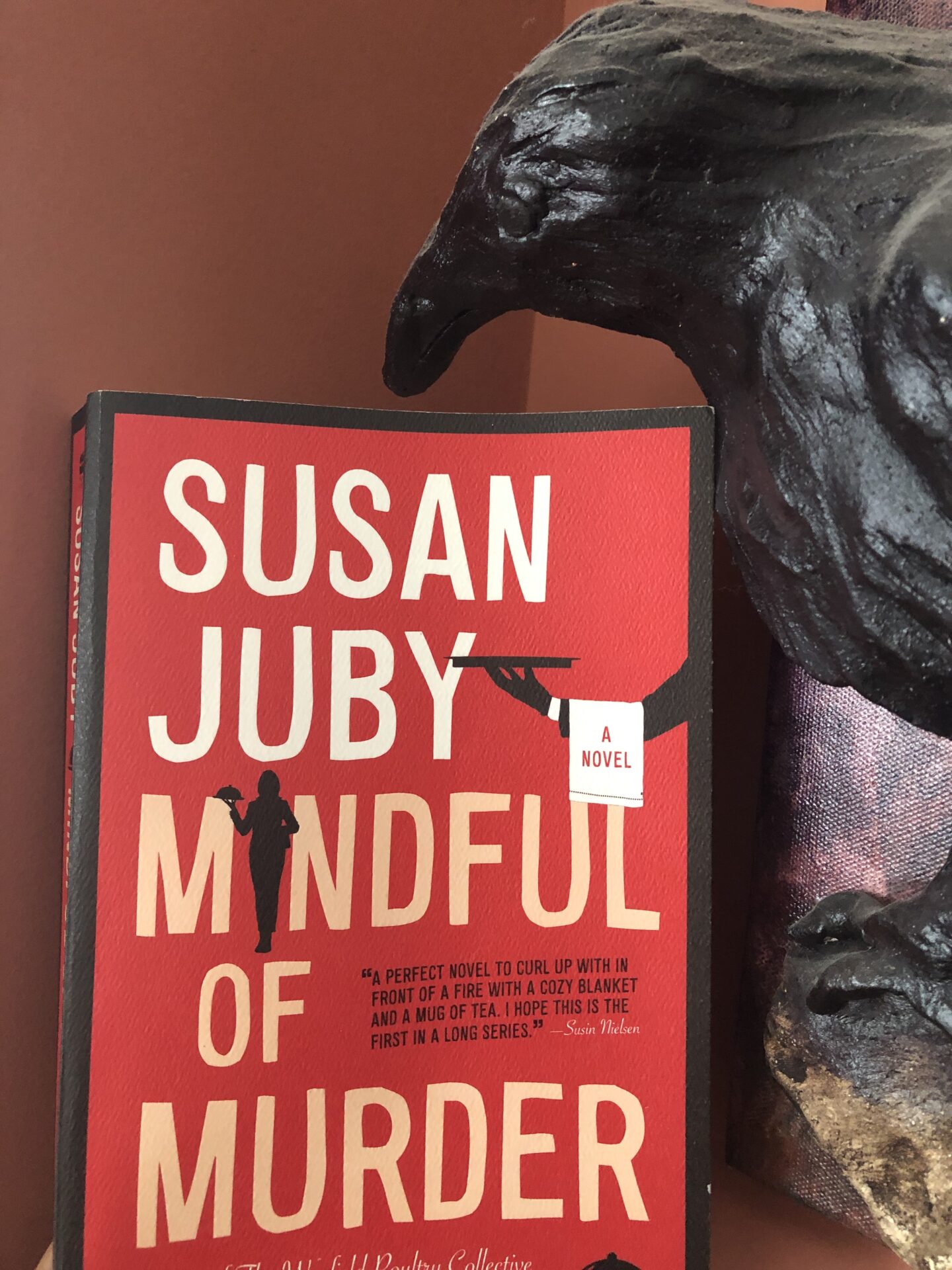
My friend Sandra sent this to me in the mail after she’d read it and told me about it when I visited her last month — what a delicious treat!
Edna, a wealthy older woman, director of a Wellness Retreat on a Canadian Pacific Northwest Gulf Island dies — obviously poisoned — in the first pages. An inquest finds the poison to be self-administered, a suicide, no foul play. Edna’s executor, Helen, ex-Buddhist nun, recently graduated, newly minted butler, has her doubts about that finding, but goes ahead with the difficult task her previous employer has set her: supervising potential heirs through a series of courses at the Retreat Centre — Floral Arrangement, Dance, and Meditation — observing their behaviour throughout so as to evaluate their suitability for taking over the Retreat Centre.
Two of Helen’s former classmates, also newly qualified as butlers, arrive to help her run the centre and put Edna’s young relatives through their paces. And Helen begins to find evidence that Edna’s death was as unnatural as she first suspected. A satisfying plot and fun detective work, but it’s also entertaining — and truly satisfying — to see the potential heirs, an unlikeable bunch overall, reveal themselves as they go through the coursework designed to nurture spiritual growth. As much as the “Woo-woo” of a Gulf Islands Wellness Retreat is gently mocked (and island quirkiness as well, in all its camped-up playfulness), inherent wisdom of the spiritual practices is acknowledged as well, and transformation displayed.
Highly recommended and I’d love to see Susan Juby (disclaimer: we taught in the same faculty at Vancouver Island University and occasionally crossed paths at the photocopier or coffee pot) write us more mysteries featuring these butler detectives.
My IG post here.
38. Cerco Te. Mauro Mogliani. Mystery/Police Procedural. Italian.
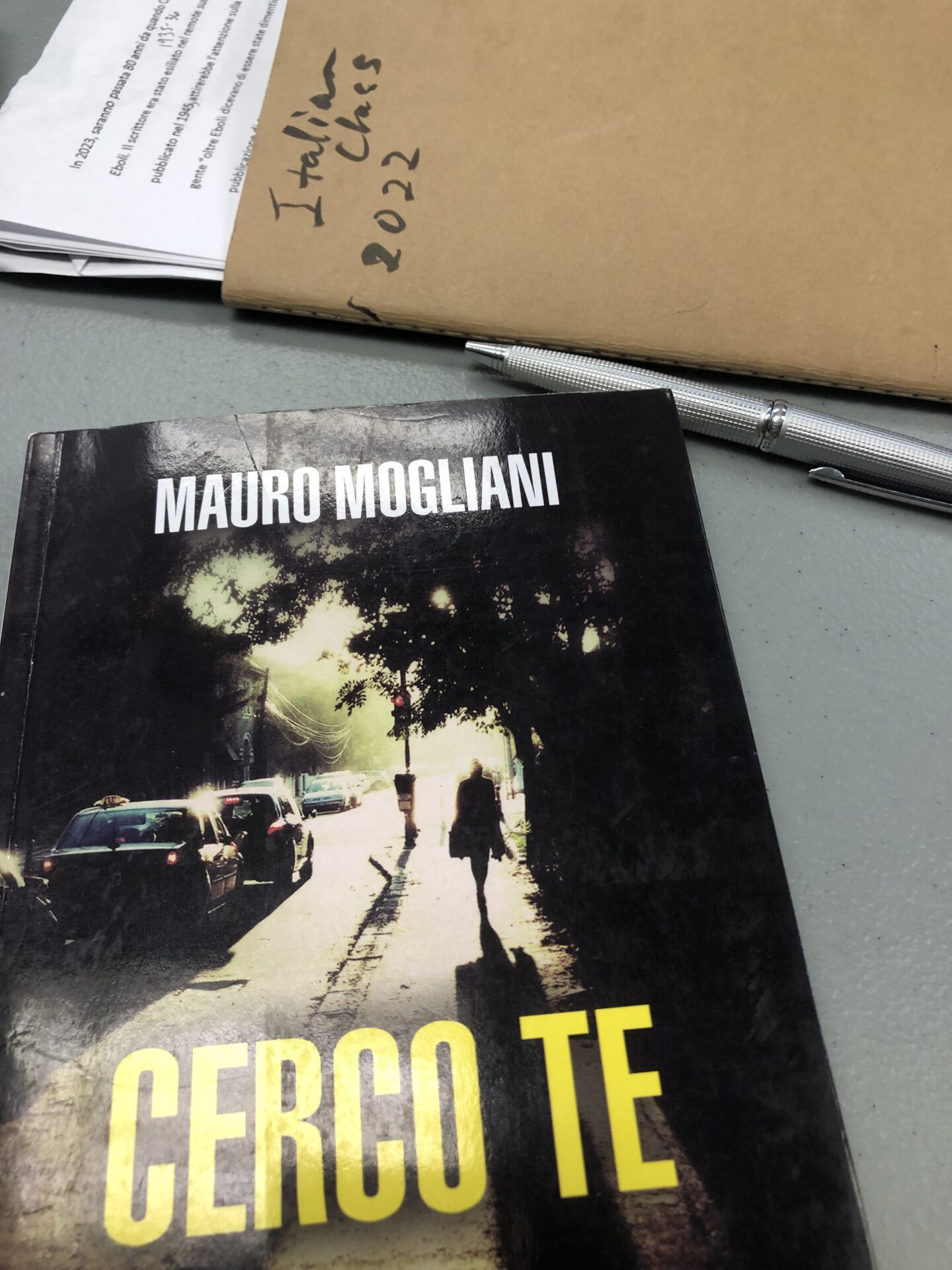
My Italian teacher, Antonia, lent me this paperback. Not only was it easier to read than Antonio Mazzini’s Rocco Schiavoni books, but at fewer than 200 pages, it was quicker to finish. Another Giallo, a police procedural (Ispettore Nardi), this one featuring a serial kidnapper/killer. An interesting plot twist.
Recommended for Italian learners at Avanzato level — it doesn’t seem to have been translated into English.
39. The Deeper the Water, the Uglier the Fish. Katya Apekina. Literary fiction. Coming-of-age. Artist-muse. Parent-child. Mental illness. American contemporary fiction.
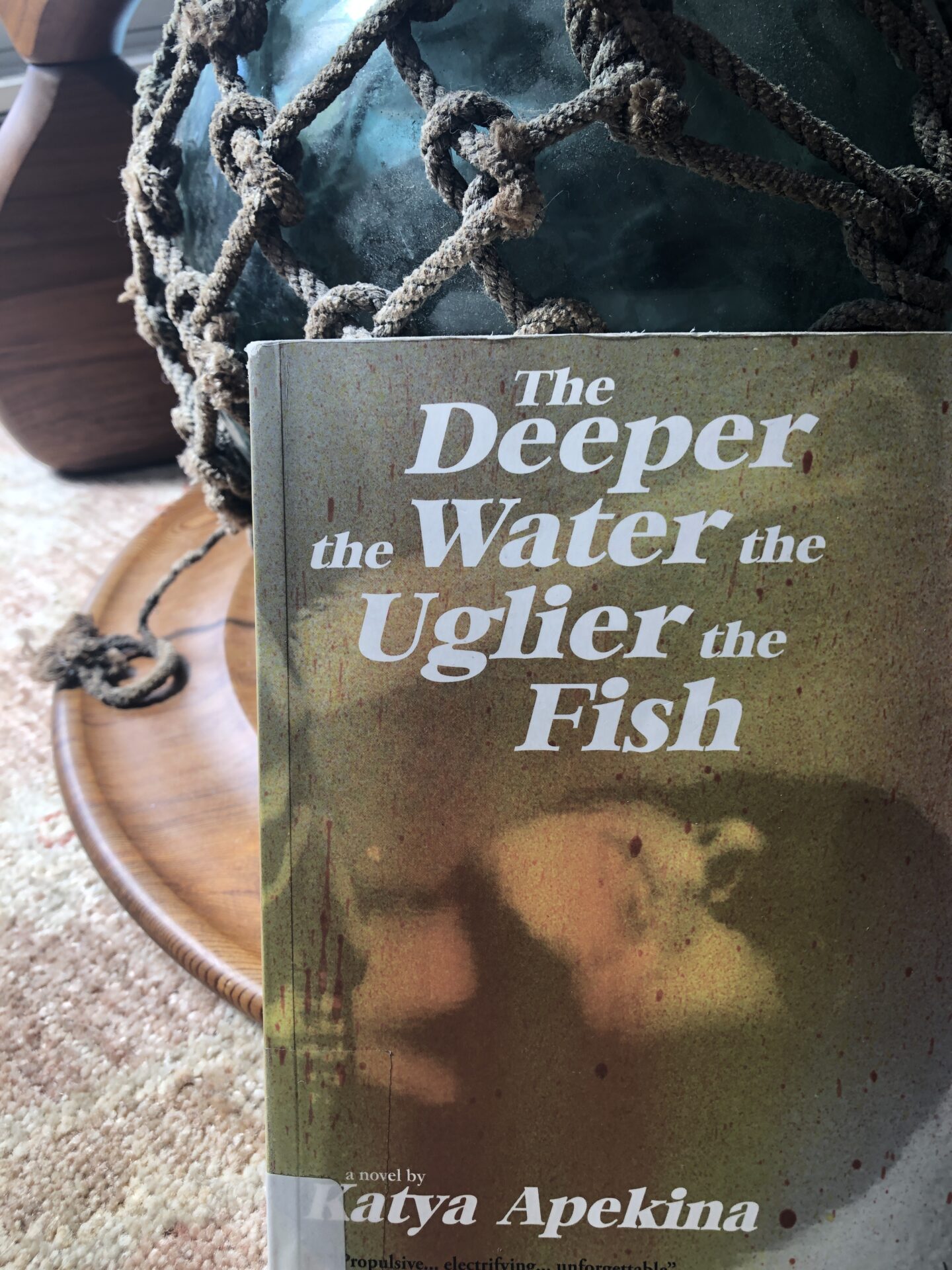
Saw this recommended on a blog I arrived at circuitously and can’t find my way back to — an impressive debut novel, compelling — no, better, propulsive! Moving, darkly funny, disturbing. Structurally and stylistically inventive (convincingly so, as in it works to support the story-telling), the story of two sisters who are taken to live with their father (who left their lives in their early childhood) after their long-unstable mother is hospitalized after a failed suicide attempt. (The suicide failed because the older sister, Edie, found her hanging from a rafter in the kitchen.)
The sisters tell their versions in alternating sections and other voices enter in short 1st-person sections. There are also letters, psychiatric notes, journal entries, excerpts from newspaper articles, & transcriptions of phone conversations, to form a narrative spanning from 1960-61 — when Dennis, the girls’ father joined the Freedom Ride as a white ally for Civil Rights . . . and subsequently met the man whose pre-pubescent daughter he “befriended” and later made his muse, married, and had two children with.
And this being made into the muse, feeding the creative work of a man who becomes a lauded literary figure while she had less and less time or energy or encouragement for her own work, is clearly a factor in mother Marianne’s unstable mental health.
Then when the sisters come to live in New York City with Dennis in the late 90s, the younger and more vulnerable Mae, with her striking physical resemblance to her mother and her desperate need for her father’s attention and love, intuits what he needs to begin writing again, and . . .
And the novel ends in Los Angeles in 2012, the sisters together again, retrospective and contemplative. . . Highly recommended, with the proviso that some will find the novel’s material difficult, disturbing, or painful. Some of the review excerpts on the cover: “dark and unforgettable,” “a confident piercing novel” “examines the fraught relationship between artist and muse.”
40. Memories of the Future. Siri Hustvedt. Literary fiction; Autobiographical fiction; Women’s Lives; Female Narrators/Protagonists Over 60; American contemporary; Feminist writer; Feminist fiction; NYC setting.
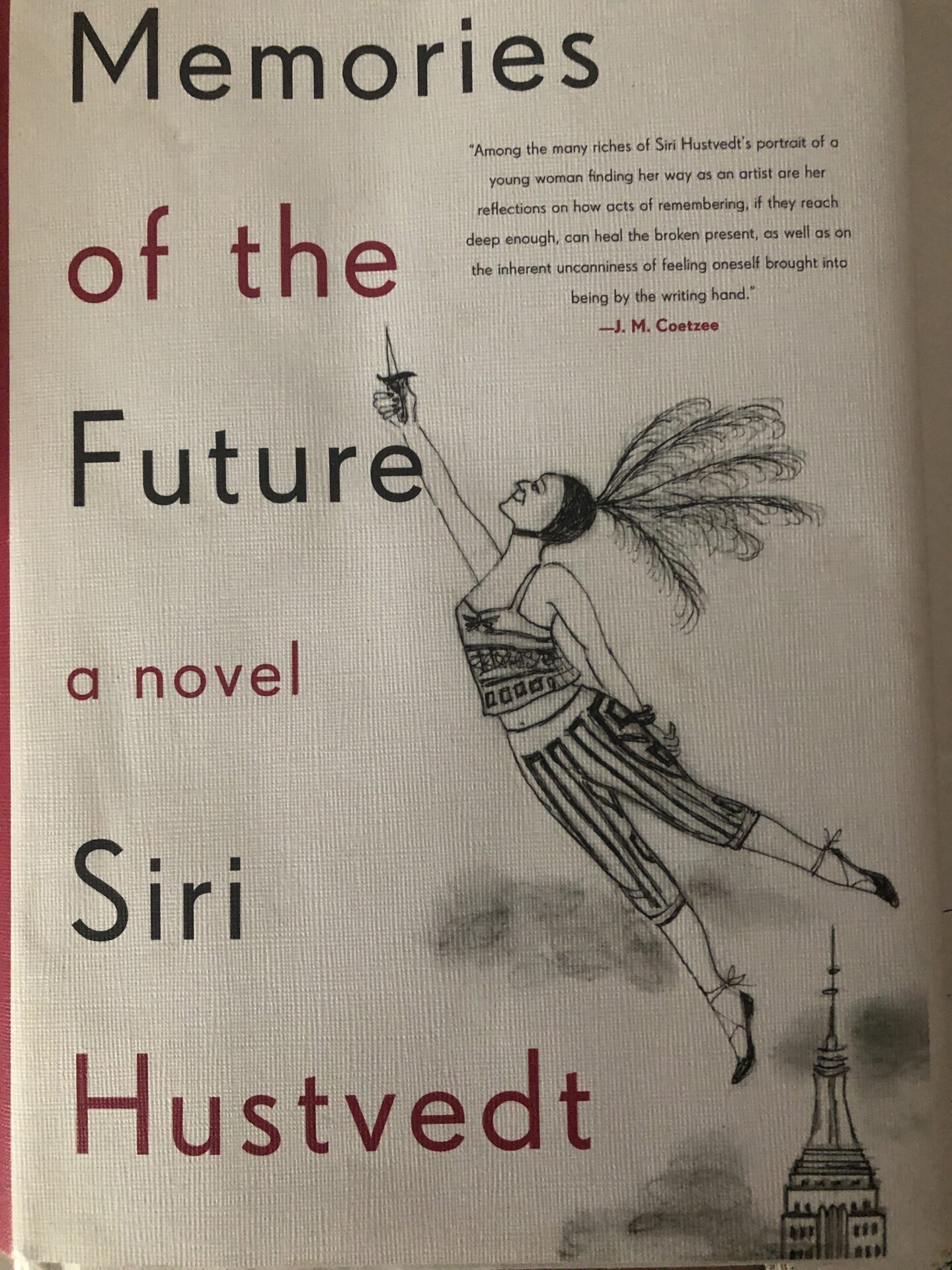
Narrated by a 60-something woman thinking back to her early 20s, when she was newly arrived in New York City, on her own, from Minnesota — a voracious, thoughtful, and discerning young reader of literature and philosophy, determined to become a writer.
The narrator is guided in her memories by a notebook she kept at the time but misplaced for decades; she’s recently found it while helping her mother (whose own memory is now unreliable thanks to encroaching dementia). As she reads her old entries, she’s also reading some of the stories she began working on in those years: further, she’s weaving strands of a lifelong interest in the work of the iconoclastic Dada poet and artist, the Baroness Elsa van Freytag-Loringhoven. As an older woman, the narrator has become aware that “the Baroness” was almost certainly the creator of “the Urinal” which the Baroness’s friend Marcel Duchamp passed off as his, after her death. (Outside the novel, Siri Hustvedt has written about the belated academic recognition of the Urinal’s provenance in this 2019 essay in The Guardian. And that’s Hustvedt’s playful depiction of her Baroness illustrating the cover of the novel. Her delightful illustrations complement the prose throughout — worth picking up a copy just to see her caricature of a certain recent president with a bouffant hair style.)
This contentious provenance is one of the subjects discussed at one of the last meetings S.H. (the narrator, whose initials are the same as the author’s) has with the group of women — self-described “witches” — late 70s feminists who rescued the young S.H. from a traumatic episode and who care for her afterward, encouraging her to embrace her powers as an independent woman.
The scene wherein these women are transformed from the mentally unbalanced figures S.H. has imagined (primarily on the basis of what she hears through the thin walls of her tiny NYC apartment) into the saviours and nurturers and guides she discovers them to be is so moving. Also the pages of her brilliant and furious dinner-party rebuttal of an arrogant older scholar who assumes she will have nothing to say on a philosophical matter. . . (Oh, how wrong he was, and how cogently she cites Wittgenstein. . . )
Then the two paragraphs describing her and Walter’s sexual relationship. . .
I’ve decided there is too little written about the topic of sex in older women’s lives for me to be coy about including this excerpt, especially since I find it so beautifully descriptive of my own almost half-century-long sexual relationship with a man who’s “turned seventy [but doesn’t like] to walk slowly,” nor is my fellow “potbellied” and he sports only a few grey hairs. But otherwise, so much captures both the continuity and the slow transformation of our intimate life together. If you fear being offended, stop reading now.
Back then Walter was not the potbellied, gray-headed oldster he is now. He’s turned seventy and likes to walk slowly. “What’s your hurry?” he says to me. “This isn’t a race, is it?” Then he was a young, slender, redheaded, nearsighted physicist with strong thighs, a sweet, straight, almost-always-at-the-ready dick, and a raucous approach to lovemaking that sent me into near delirium. When I remember our first two years together, I sometimes see us from a great distance in our first apartment as if I am high in the sky looking down at two naked Lilliputians of the past. I see the little naked woman chasing the little naked man down the stairs. I see the little naked man chasing the little naked woman up the stairs. I see the little naked woman playing the Hussy and showing her little naked backside to the little naked man in the room where they keep all the books. I see the little naked man leaping onto the bed, his arms wide as he beckons his own, his darling, his beloved to hop in beside him. I see their four naked arms and four naked legs and their two hairy heads locked in a kiss. I see them doing the heavenly bounce on the mattress of the four-poster, on the rug, on the kitchen floor.
Walter and I are old lovers now. We have done the heavenly bounce thousands of times. Over and over again, my fingers have slid down his naked chest and made their way to his soft sleeping cock that I have then felt grow and change in my hand. Over and over, I have handled the silken skin of his balls and have felt the slight burn of his beard against my cheek and my breasts and between my legs. I have lost myself in the feeling of him so often that the man couldn’t be ousted from my body even if I wanted him gone. Our flesh is mingled now. Our thoughts overlap. We have taught each other much but can’t always remember who taught whom what. We grow old, and I know each of us dreads the other’s death, although we rarely talk about it. Time will tell. Unless we explode together, one of us will die first.
Memories of the Future, Siri Hustvedt. New York: Simon & Schuster, 2019. p. 308-309.
In fact, this excerpt could probably introduce a post that tested the room for a conversation among us on this topic. It’s one I’ve occasionally thought of broaching, but so far hesitated, procrastinated. And to me, this is one of many gifts literature offers us — to see our experiences reflected so clearly that we recognize ourselves — often with pleasure, also sometimes with relief, comfort — and that we have a starting point for conversations that build connections. And also expand our ideas of “the Other” — in this case, arguably, a societal view of older women’s sexuality.
Before I open the mic for your comments. I’ll just point out that Memories of the Future would read well with Deborah Levy’s Real Estate. Also, that I’ve written about other novels by Hustvedt here and here. And that I’ve posted another excerpt from Memories to my IG reading account.
Now, before I hesitate any longer over that “Publish” button. . . .over to you. Anything that resonates with you from this post and, of course, any books you’d recommend (or warn us away from!). Also, feel free to share this post with any other readers you know who might be interested. . . (There are a few icons below for sharing via Social Media.)
Frances, that excerpt would be the perfect conversation prompt! Older women’s sexuality seems to be one of the few remaining taboos in society.
Author
Agreed!
How interesting,as always!
Yes, I would like to read everything from the list (as always)
So far, I’ve read only Dona Leon’s book
Here is so hot,and I’m not going to the seaside or anywhere else and I’m ok with this( because of my mother’s operation), so,only light reading (but not too light) will be in plans for July
June was different,so…..:
Clare Chambers’ Small Pleasures is set in Fifties,in the suburbs of London. The main character,Jean Swinney,journalist on a local paper,the woman who could be independent,living her life,if there was not her mother,suffering from a lot of things,binding her unmarried daughter as a carer (the other sister is living abroad). After a very curious investigation for her newspaper,Jean could find her chance for love and happyness. But………One of the author’s favourite books is Excellent Women by Barbara Pym-there are some similarities in style
Panenka by Ronan Hession is a lovely,sad,poetic but a very direct book about a former football player, living (and suffering), more than 25 years after his fatal mistake (Panenka is a nick name,after Czech player Panenka,and a technique used while taking a penalty kick).Beautiful book
Valérie Perrin’s Fresh Water for the Flowers is moving,sometimes funny,tragic but hopeful novel. Atmospheric,absorbing story about beauty in the ordinary,about Violette Toussaint who is the caretaker at a cementary in a small town in Bourgogne….and she has a story indeed!
Lucy Foley’s The Paris Apartment-it was interesting and it delivered what I’ve expected
Madeline Miller’s The Song of Achilles-I love Greek mythology (although the Gods are cruel,vindictive,vain,tragedies are everywhere,as well as deceits and horrible relationships),I love Homer’s epic works (we’ve learned a lot of it in school and I’ve had Latin for two years),I love Dictae et Sententiae (and quotes,proverbs and sayings-as you’ve read here a lot of times too much) and,yes,I loved this book,naratted from the perspective of Patroclus. Miller tells her story (and she has her take on history,or history as described by Homer and others) about Achilles and Patroclus,their immortal love and the Trojan war. Yes,I was a little bit naive all those years about their friendship (or right,who knows).Can’t wait to read Circe,her another book (yes,this is for July :))
It is so hot that I’ve written Gods as Goods,there could be more spelling mistakes……
Dottoressa
Author
Thanks, as always, for your generous and discerning contribution to our reading lists. I felt as you did about The Paris Apartment — diverting when that’s what I needed. I’ve read Circe and enjoyed it very much — must finally get ’round to The Song of Achilles. . . And I read and loved Valérie Perrin’s wonderfully moving novel (such an unlikely setting — a cemetery! — for so much beauty). Would love to be able to sit over Kava sa šlagom with you and talk about books we’ve both read!
The other recommendations will be added to my list.
Hoping you get some cooler weather soon. . .
A quick early comment before I go away to think….thank you, thank you, for introducing this fascinating and wonderful topic…and for hiding it so cleverly in a reading post, ha! For older women’s sexuality (well women of all ages when I feel it’s required) is the very thing I have been ‘banging on’ about for the past few years to anyone who will listen.
(And I wonder if you have a source for books in Italian, although I see your teacher passed that second one on to you. I have used Amazon, but…)
Talk soon when brain settles down.
xxxx (hugs of glee)
Author
I was so pleased to get this encouragement from you (I had some concerns, obviously, about introducing the topic, but did think I might rely on readers such as yourself). Thank you!
As for a source for Italian reading — some have come from our Italian centre’s Zoom “Book Club” (we usually read well-chosen chapters of a novel, or essays, or short stories); some were recommended in courses (in one class, we read our way through about half of Antonio Mazzini’s Pista Nera — few in the class are as keen readers as I am, so faltered by then, but I was hooked, as you might have been), some from Italian podcasts (have to see if I can remember for you). . . and I’m very fortunate to have access to an Italian library at Il Centro, so that I can browse book spines and read fly leaves (hmmm, that looks odd, as a plural, but I think it must be right). As well, our public library here has a decent selection. . .
Interesting. I liked these books, already ordered the Juby book. My husband and I are 79, look forward to further talks, maybe part two!
Author
Oh, enjoy the Juby book — and we’ll see about a possible part two 😉
I loved this post, Frances. Thanks for going where so few want to go. Maybe our time has come. After all, the “coastal grandmother look” is the fashion aesthetic of the moment. Many many thanks for recommending books I can’t wait to read! Also thanks to Dottoressa for her suggestions.
Author
Ha! That “Coastal Grandmother”! — if there’s a chance of commodifying these days, they grab it, really!
We’ll see if we can build a conversation here — meanwhile, you’re welcome re books. And isn’t that Dottoressa a great reader?!
Thank you both!
D.
I am so glad that you have come back to the topic of sexuality and older women, or, for some of us. old women. Especially in the US this seems to be a taboo subject. I have enjoyed a few European films and TV series which present romantic and physical relationships in the 70 plus, but in the American films it seems one of the couple has to have dementia, at least the ones I have seen. I can’t even talk about this to my peers now. The one friend who I could discuss anything with sadly died last year. At 74, a man with whom she had an affair with years before had sought her out after his wife passed away. At the beginning she told me of her fears of physical intimacy, especially after years of not seeing each other and mutual expectations. they went on to have 8 satisfying, loving years together. Now she is gone.
Back to books. I love Donna Leon and eagerly await each new book she writes. Recently I read Armor Towles The Lincoln Highway. I had loved A Gentleman in Moscow. I might not have been interested in the story had he not written it. It was Ok but it was a book I liked more at the beginning but not so much as it went on. I have been reading books this summer which are not frankly, a challenge. my concentration has waned, which I attribute to just about everything going on in the country at this time. I read Apples Don’t Fall, by Lianne Moriarty, an Australian author. To my surprise I quite liked it and found this mystery/family drama a more substantial read than anticipated. I also read The Good Left Undone by Adriana Trigiani. I have read a number of books she has written and have found them entertaining. This historical, family saga, while not my favorite of hers was interesting. Currently I am reading Delicious by Ruth Reichel. It is a selection for one of my book clubs. It is a few years old and her first attempt at fiction. I have found her memoirs and essays really good. Although fiction, I was stooped in my reading tracks when she brings up as a character I actually know. a kind of literary cameo. a women I first met when she was horseback riding at the barn where I board my horse. Bonnie runs an antiquarian cookbook store in Manhattan’s Greenwich Village. I have visited there on more than one occasion and purchased a gift for my daughter. Deciding what book(s) to bring for my one week vacation beginning Sunday. Horsey, pony activities are planned as is beach time, maybe even a bit of local artisan shopping, but you have to consider the weather.
Moriarty polarises many readers, even here in Australia. I’ve enjoyed some of her books, particularly the Husband’s Secret and Big Little Lies, while others haven’t engaged me as much. I heard her speak once and thought her charming and self-deprecating. The ease of her writing style is particularly appealing when I want to take my mind off pandemics, wars, floods…and I love that some of her books are set in the part of Sydney where I live.
I agree, Maria. She does polarise readers.
Apart from ‘Nine perfect strangers’, I have enjoyed so many of Moriarty’s books – her style appeals to me and her books are very easy to get into. My particular favourites (with titles that don’t really appeal to me!) are ‘The hypnotist’s love story’ and ‘What Alice forgot.’
Author
What a wonderful story about your friend — I bet you miss her, but wow! imagine having smoething so lovely happen at this end of life.
Thanks for adding to our TBR lists — as if they’re not long enough already 😉 How fun that you ran into a fictional version of someone you know “IRL,” as they say. Enjoy your time at the beach — oooh, and horses and ponies! Wonderful!
Frances, I admire your bravery and thank you for raising the tricky subject of older women’s sexuality. I resent it when shop assistants “don’t see me” (I’m 68) and am sad when young people sometimes dismiss my views simply because of my age (what would I know about how hard it is to buy a home, change jobs, find love etc.) but it so is so much worse in the area of sexuality. It appears that advancing age is accompanied by an unavoidable cloak of sexlessness, at least in popular culture, and it is helpful to acknowledge the problem. Also helpful are your wonderful and generous monthly reading lists. I’ve added Levy and Juby to mine. Here’s a suggestion for you – Ruth Wilson’s The Jane Austen Remedy. Wilson is 90 and her memoir is about how, at 70, she re-read Austen’s fiction to find consolation, and which unexpectedly led her to the best years of her life. A remarkable woman and a remarkable book.
Author
It’s true — the failure to consider that sexuality continues into our later years seems an extension of that invisibility we acquire in other areas. But I believe that there must be some interest and curiosity, probably accompanied by awkwardness/hesitation because of an assumption that our generation doesn’t talk about such things — and a fear of offending us. Perhaps by talking among ourselves, at least, we might make space for a conversation that could safely bring that curiosity in. Or something like that. . . We’ll see.
I will look for The Jane Austen Remedy — these memoirs about living with grace through these last few decades are treasures, I find. (I would recommend in turn the late Diana Athill’s last three or four books).
1. Have just ordered three of the titles you mention here, Frances! Thank you for helping us find books we might not have run into, otherwise.
2. YES, let’s start exploring later-in-life sex lives, particularly amongst a group as engaged and experienced and reflective as yours!
Author
Enjoy your new books, Terry! Like you, I’m always pleased to find new sources for my TBR list — even if that grows too quickly!
And thanks for your encouragement . . . I hope to put a post together in the next few weeks.
Thank you Maria for mentioning The Jane Austen remedy. I had read a review and it sounded very good, but I couldn’t remember the details.
Liane Moriarty has helped me survive the pandemic (apart from Nine perfect strangers) as has Jane Austen on audio and in books.
One of my pet peeves is being greeted as Young Lady by youngish men who think it incredibly witty. I should add I am 76 and look it…
Author
Oh yes! Or being called “dear”. . . Not entirely sure I understand that in any way 😉
Back again, somewhat calmer but still eager for discussions to come. Really the ‘problem’ (heh) with some of your posts lately is they just scream for long in-person conversation. The kind where you stop looking at one another and just gaze into space and let the words flow. Ah well, they will have to flow through the fingers I guess.
I really like the way Siri Hustvedt writes about relationships, and the paragraphs you’ve shared here reinforce that. I rummaged around a bit as I thought I had noted some words from What I Loved; Bill and Violet absolutely captured me (to the extent that I was able to overlook almost all of the other characters who I found, um, less intriguing). I found something from Yonder, but no, that was not it…then aha! a phrase popped into my head ‘a fierce, intense intimacy’. Oh, yeah.
From the comments (all so interesting!) I gather there will be more to come so I will save the pages and pages of words I have on the sexuality topic (age/youth, partner/not, body/mind, love it/like it/meh, talk about it/never a word). There is so little said as we all agree but almost as bad (worse?) is that what is said leans a bit toward the negative and fearful. I’ve read (or encountered and not read) lots of articles on dryness, and shyness, and disinterest, but I never see the story of a woman who, at age 61, woke up one morning with the libido of a teenage boy.
I think I’ll try to get off my lazy bottom this winter and get back to Italian class…of course they will have a library…I had forgotten that, thanks for the reminder!
Author
Okay, I’ll get organizing my approach — perhaps I should invite a few submissions but first at least “thematize” a bit, as you have here. So many stories I don’t know but that I could make room for, perhaps. . .
I have a few busy family and summer-y weeks first, but this will happen. . . forse — I’ll mix my languages — for La Rentrée
I began reading the Brunetti series when I first came across it in the mid 90’s. The more recent novels have a sense of melancholy and bitterness. Donna Leon grieving a lost Venice as she first knew it, the changes wrought by corruption and apathy. In Give Unto Others I felt the bitterness was tempered by acceptance and the focus on Brunetti’s examination of his own memories and motives made oddly, for a more hopeful and better novel than the last few books.
I think some men, not all, fear womens sexuality. They see it as a source of power and want to pretend if it is not discussed, it doesn’t exist.
Author
Yes, I would agree with you about that move away from the bitterness that had become an intrusive note in her last several novels. I wonder if the peace, the abatement of tourism, that the pandemic brought to Venice is at least partly responsible for the change. . .
I’d agree with your second point as well, but I also think we tend to silence ourselves and/or each other. Maybe we can make a tiny dent in that tendency here.
Before this post gets buried too deep in the archives, I want to post a few of my thoughts…on sex. Sexuality is a bit of a different topic. I believe that until around menopause, most of us are sexually on a level field. Our hormones are engaged and if we are lucky enough, we have had many years of umm, “chasing our partner up and down the stairs.”
To me, sex at almost 70, requires a little more attention than sex at 30 or even 60. Sex is no less satisfying but different. I am lucky in that my health is good (subject to change at any time) and my partner’s health is good. That said, I think age brings many sexual challenges to women including: a drop in hormones, post menopausal symptoms and for some, incontinence, medication side effects, death of a partner, partners with prostate problems or other health issues. As “older” women, I think many of us are at different points in our sexual lives and that’s ok, although it may not always feel ok. Thanks for introducing the topic Frances, maybe I should have commented on the books….
Another great book list! I admire your voracious reading and your great book summaries in your posts. I’ve read a couple Leon books and enjoyed them. Time to grab another one, but I’m still on the earliest ones, so won’t get to this one for a while.
I’m interested in reading Real Estate and Memories of the Future.
You may have guessed from my recent weekend blog post that I am an advocate of discussing the sexuality of older women. I think that we have something to contribute to that conversation!
I just finished reading Ruth Reichl’s My Kitchen Year and that has me wanted to recreate several of her recipes. It’s a nice journey with her through the year after she loses her job when Gourmet magazine suddenly shuts its doors. It’s light on Ruth’s great writing, but it’s meant to be a combination diary of the year and cookbook, so it worked for me.
I recently finished a quick summer read, Beach Read by Emily Henry. It was recommended by a commenter on another blog. It delivered exactly what I wanted in a light “beach read.” I like Henry’s writing, the plot was good and the (youthful) sex scenes were very well written.
I’m now reading Alice Water’s Coming to My Senses. So far, it is a good introduction to her life leading up to the opening of her restaurant.
I hope to come back to this post and read through the recommendations in the comments. I saw something about an Austin themed book that I need to make note of.
Correction “Austin” should be “Austen.”
Oh my! I think I want to read all these books this time. Would that I got to them all. I’ll probably start with the Deborah Levy, although perhaps I won’t as I haven’t yet read the first two volumes of this series. They are piled on one of the many stacks around here. Perhaps a mystery….